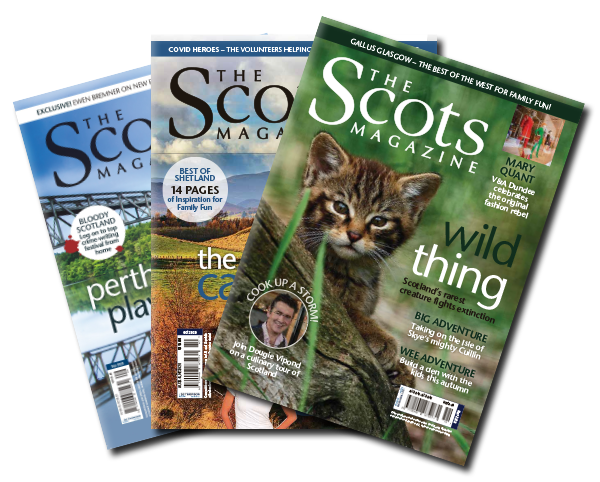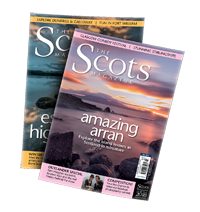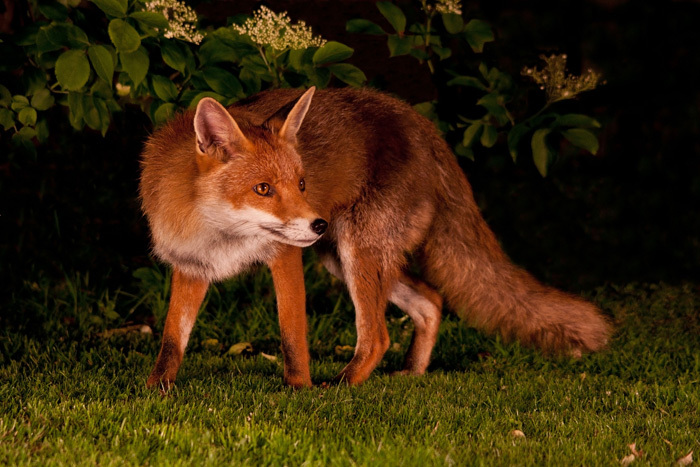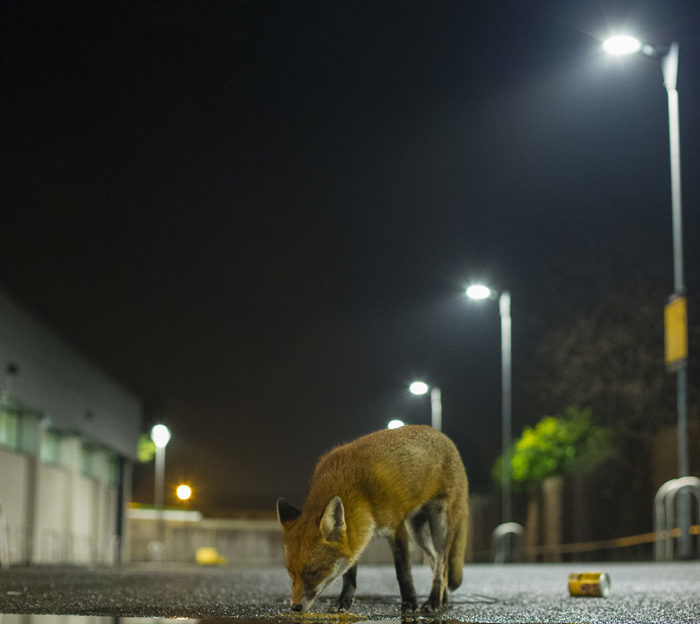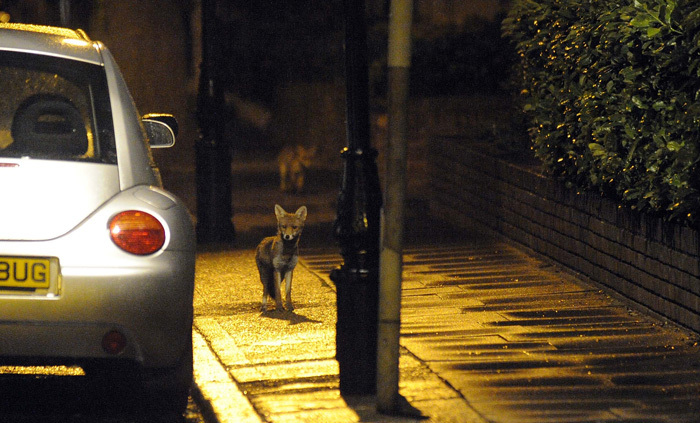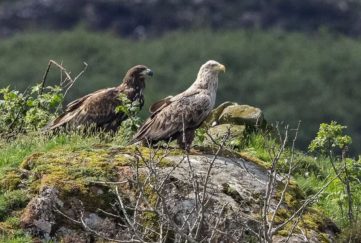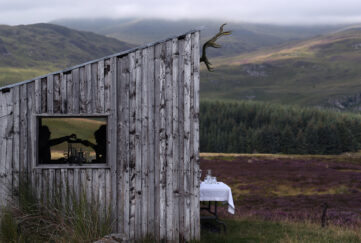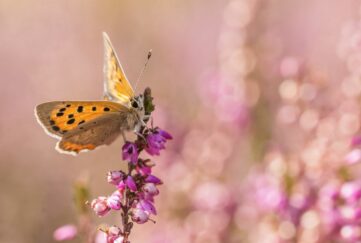Fantastic Mr Fox – Jim Crumley
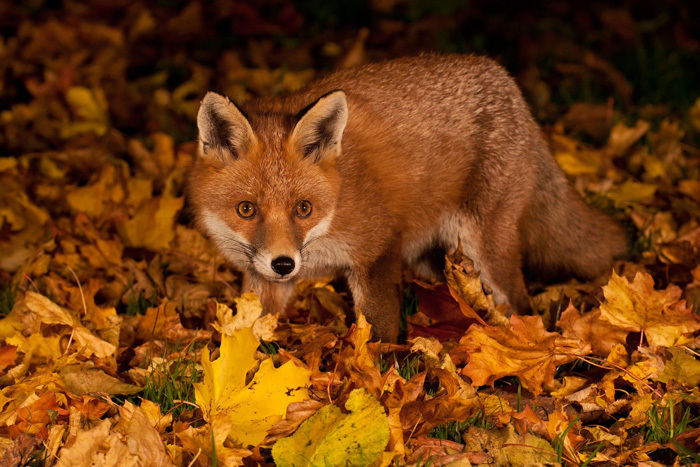
 Jim Crumley has an extraordinary and particularly interesting encounter with a fox…
Jim Crumley has an extraordinary and particularly interesting encounter with a fox…
“Midwinter and all dulled but the wind and the stars. The dead of the dark winter; stretching behind me the dim patch of silent days alone. The wind is a tooth in the breast… the dark suns give no light.”
Oh, how I wish I had written that! But I didn’t. It is the opening paragraph of one of my favourite books, Autobiography by Margiad Evans, and the chances are you will scratch your head and say to yourself, “Who’s Margiad Evans?” and you would not be the only head-scratcher. She was a nature writer who lived around the English-Welsh border, and she died over fifty years ago and not quite fifty years old. Her output was sparse, and most, if not all of it, is now out of print.
I stumbled on her Autobiography by accident in a bookshop that was closing down, sometime in the late 1970s, and I see from the pencil marks on the front endpapers that I paid 75 pence for it. Such a return for such a meagre investment! I have read it at least a dozen times and I must have read bits of it hundreds of times, especially in winter. She was exceptionally good on winter.
I was walking the forest track under stars and that first sentence slipped into my mind like a hand into a warm glove. The first time I read it I thought it was the perfect first sentence, and nothing has change my mind over the years. Frost paled the grass on both edges of the track so I could see where I was going and I could walk with my head up, stargazing at the thin wedge of sky between the tops of crowding spruces. Black in such circumstances is a multi-layered colour – darkest green and darkest brown modifying to darkest blue in the treetops and the inky navy of the sky.
There were three sounds – the river unseen and a hundred feet below the track and, subdued by the stealth of ice, the wind in the trees and the soft rhythm of my own boots on the anvil-hard ground.
I stopped often to listen to the night, straining for any dropped hint of fellow travellers, roe and red deer, owl, pine marten, but particularly fox. January in my mind is the red fox month.
And then, I had company. The moon had heaved over the ridge to the south and thrown me my own moonshadow. I waved to it. It waved back, of course. The forest was suddenly alight. Mountain ridges fell into place as the trees began to thin out. At the high end of the track the glen suddenly opens out into a kind of upper chamber. It is a space I know as well as any portion of all wild Scotland, but now I saw it with new eyes, a floodlit arena of nature, for it was simply drenched in moonlight.
But it also harboured a different species of midwinter from the one where I had left my car, below the beginning of the forest. Up here, ice held sway. The river was all but stilled, and every rock and crag and buttress and gully was swathed in ice and some were hung with icicles, and all of it wore the added sheen of the all-but-full moon.
Then the fox came.
A two-syllable bark, a thin and harsh contralto note, a pause, then a third. Then a long pause, then a perfect triplet, the siren song of the vixen, the midwinter voice of the mountain wood, for in January of all months the red fox has mating on its mind.
The voice rose from the nearest stand of spruces, and in my mind’s eye I saw it climb above the trees in a thin cloud of silver smoke and hover there like breath, like breathing.
This, more than anything else, was why I was out in the midwinter night at the upper edge of the forest where it gives way to the mountain. This voice, which you can hear in the suburbs and parks of Dundee or Edinburgh or Glasgow if you care to step outside your back door, or even just turn the television down, this voice is always and forever in my mind the midwinter voice of the mountain wood on a quiet night.
I carry in my head an anthology of such nights, and some are starry, some snowy, and one way or another, I have written them down.
Quiet Tonight
Quiet tonight, not silent – sideways snow
made hasty whispers at the window,
not still – rummaging winds ballooned the flakes and rattled the black oaks.
What made it quiet was the pallid darkness of the snow-stuffed sky
and the shy lull that followed fox bark after fox bark after fox bark.
My fascination for foxes grows as the years pass, likewise my admiration. So many hands are raised against them. So many minds devote untold hours to thinking up ways of killing them, to dreaming up lies about them.
I find myself wondering how it is that the fox survives – thrives – yet the wolf, which is no less cunning and clever succumbed to the worst excesses of our race. I suppose part of the equation is that the fox hunts of the land always ensured there were enough foxes to hunt, and within living memory were not above importing foxes from France to keep the numbers up.
The vixen emerged from the forest the way I had seen her do it before, by way of the trees that crowd the edge of the track, a long pause half in and half out of the wood, senses tasting and testing the air. She must have caught my scent instantly for I had walked past where she now stood, and not half an hour before; and I was leaning on a rock not 200 yards away, and as vividly lit by the moon as she was herself.
She came and stood on the track and stared at me, blatantly, and if I had been a keeper with a Land Rover and spotlight on the roof, she would be lying on the track in a spreading pool of her own blood, but instead she was spotlit by the moon and the track possessed no more of her than her footprints, her scent, and her shadow.
She turned then and came straight up the track at a rhythmic gait – a foxtrot – and stopped dead in her tracks at the sudden sound of the dog fox calling from deep in the wood. She stared at the sound, turned again to stare at me, barked three times, and finally turned on her heels and retraced her steps back down the track, back into the trees, back into the moonless depths of the spruces.
“And my work here is done,” I told the mountain, and retraced my own steps back down through the forest, the moonlight on my face, and the midwinter voice of the mountain on a quiet night was in my head. I heard no owls, I saw no deer, no pine marten, no other bird or beast, but the foxes were where I hoped they would be, and thus far into nature’s new year at least, all was well in their world.
I suppose it must seem to some people a strange reason to rise from the dinner table, hap myself against the outside cold, drive a few miles along an empty single-track road, walk up through a night forest to a high mountain glen, sit there for half an hour in the freezing moonlight, listen to the voices of two foxes, catch sight of one of them for no more than two minutes, then walk back to the car, drive back to the place where I started, and consider it all a good evening’s work.
On the face of it, I did nothing. I was alone the whole time. I had some exercise and breathed clean air for about two-and-a-half hours all told. But this is how the nature writer’s life sometimes works. This is all about going out again and again, reworking familiar circumstances, learning about the mountain by accumulation of fragments of knowledge, and these are the brushstrokes that work the canvas, and somewhere further on all that has been seen and learned and – mostly – written down (for that is the nature of the job and the object of the exercise) will amount to an understanding.
Meanwhile, the year has turned through four seasons and foxes have graced them all, and with this new year I have reached back through the seasons and brought that old midwinter back to life in my mind.
“Midwinter, and all dulled but the wind and the stars,” – and the memories, and that new thing that forever sharpens understanding. Margiad Evans wrote, “Write in the very now where you find yourself… There is no substitute, even in divine inspiration for the touch of the moment, the touch of the daylight on the dream.” Except perhaps the touch of the moonlight.
- An urban red fox
- Foxes are equally at home in the countryside and in cities
- A fox in the heart of London
- Gardens provide food and shelter for foxes
You can read more of Jim Crumley’s Scottish wildlife columns online here, and each month in The Scots Magazine.
Subscribe to The Scots Magazine today for more from Jim Crumley >>
